Vice President for Education and Student Affairs inaugurates the Forum of Laws and Procedures Governing the Rights of Persons with Disabilities
Prof. Dr. Abdel Fattah Saoud, Vice President of Ain Shams University for Education and Student Affairs, inaugurated the forum organized by the Student Service Center at Ain Shams University on laws and procedures regulating the rights of people with disabilities, under the auspices of Prof. Dr. Mahmoud El-Metini, President of the University, and in cooperation with AMIDEAST and Helm Foundation In the hall of the Faculty of Science, in the presence of Prof. Dr. Taya Abdel Latif, Advisor to the Minister of Higher Education and Scientific Research for Student Activities, Prof. Dr. Mustafa Mortada, Dean of the Faculty of Arts, Prof. Dr. Muhammad Ragaa, Dean of the Faculty of Science, Prof. Dr. Salwa Rashad, Dean of the Faculty of Al-Alsun, Prof. Dr. Osama El-Sayed, Dean The Faculty of Specific Education, Prof. Dr. Muhammad Safi, Dean of the Faculty of Law, Dr. Rana El-Helaly, Director of the Service Center for Students with Disabilities at the university, and a group of deputies of faculties and faculty members, Prof. Muhammad Al-Khatib, Assistant Secretary of the University for Education and Student Affairs, Ms. Caroline Maher from the Helm Foundation, and Dr. Dina Mohsen, Director of the Disability Program AMIDEAST Foundation.
In his speech, Prof. Dr. Abdel Fattah Saud, Vice President of Ain Shams University for Education and Student Affairs, confirmed that the name (People with Disabilities) is a badge on the chest of whoever carries it to remind that he is a person who exerted more effort than a healthy person to reach his goal.
He added that Ain Shams University pays great attention to people of determination, with the aim of providing a graduate of merit; By developing his capabilities and providing adequate access to his university, pointing out that the university, from 2013 until the current fiscal year, spent huge amounts of money to provide access to people with disabilities; Where they were taken into account in the new constructions, as well as updating the existing ones, in addition to renovating the Vision Center at the Faculty of Arts and achieving availability throughout the university campus.
He added that there were small centers in colleges that provided services to people with disabilities, until the establishment of the main center, which helped develop small centers and develop a general strategy for dealing with people with disabilities. They can be developed so that they become useful members of society.
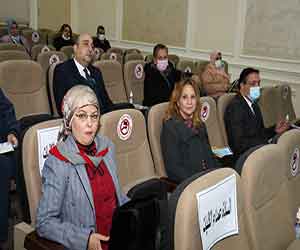 |
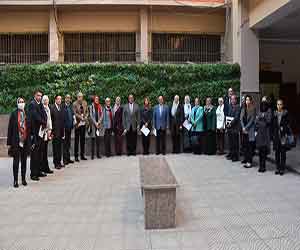 |
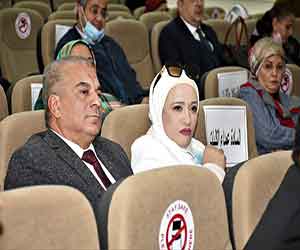 |
||
Prof. Dr. Abdel-Fattah Saud stressed that the new republic needs the participation of all members of society in the development process, especially since according to the new law for people with disabilities, nearly 10 million people fall under the category of people with disabilities, i.e., nearly 10% of society, and therefore we must rehabilitate them in a way Good and involve them in development.
He added that the meeting aims to shed light on the new law for people with disabilities and its executive regulations, and explain its provisions to executives in all faculties, whether the person with a disability is a student, a faculty member or a university employee.
For her part, Dr. Rana Al-Hilali, Director of the Service Center for Students with Disabilities at the university, confirmed that the center’s goal is to graduate a student who deserves the certificate granted to him, where all the requirements that the student needs are provided, such as taking into account the scientific material and providing the appropriate tools that achieve good education, such as providing sign language, increasing Exam time, dealing with learning difficulties, providing workshops, etc.; to present a graduate with the same competence as a healthy person.
She added that the center pays attention to hidden disabilities, as sometimes the student suffers from a disability but does not disclose it, so the center determines his abilities and provides the means of availability that achieve the graduation of a qualified person.
Dr. Dina Mohsen, Director of the Disability Program at AMIDEAST, spoke about the scholarship program offered by the Foundation in five Egyptian universities, including Ain Shams University, within the framework of the agreement signed between the Foundation and the Ministry of Higher Education.
It clarified the goals that the institution seeks to achieve with people with disabilities in the field of education, which is to review the internal policies of colleges with regard to people with disabilities, and to develop a policy guide for how to deal with them, while spreading awareness of the rights of students with disabilities and raising the efficiency of university workers to deal with them, while achieving access to them at the level of courses. or spatial availability.
She said that we seek to change the view from sympathizing with them to a societal view that depends on raising their capabilities and benefiting from them to benefit society like a healthy person.
In her speech, Mrs. Caroline Maher introduced the Helm Foundation, noting that the Foundation works on three goals, including conducting community awareness, providing access projects, and how to make a person effective in society, in cooperation with institutions and universities.
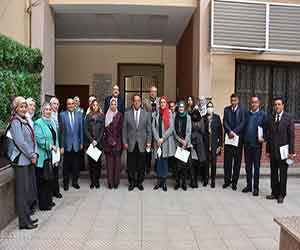 |
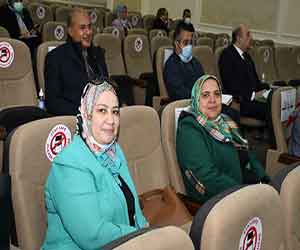 |
It also provided an overview of the history of human rights and the difference between the constitution and the law and the executive regulations for the law.
She also touched on the new law for people with disabilities, which was produced by the committee that was created in the Egyptian parliament in 2016. The previous law, which was established in 1975, suffered from shortcomings and did not cover all the important points.
She reviewed the chapters of the new law, which includes seven chapters, and shed light on the three chapters related to the student, where she talked about the chapter on education, which includes the need to prepare cadres to work in the field of disability through specialized colleges, and to include in the curricula the concepts of disability and awareness of their needs and rights. Illiteracy in the new law, which proposed the development of literacy and adult education programs to suit people with disabilities.
Ms. Caroline Maher also addressed the chapter on vocational preparation, training and the right to work, and the chapter on societal and criminal treatment of persons with disabilities.
At the end of the meeting, a discussion took place among the attendees, and many suggestions and ideas were put forward regarding people with disabilities.


.svg)




